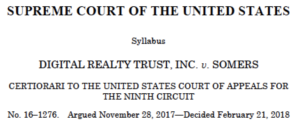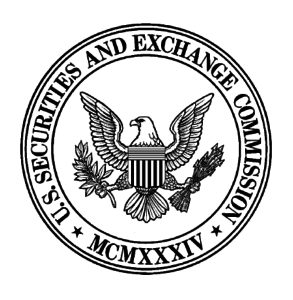Private Enforcement Of Dodd-Frank Whistleblower Protections
US Supreme Court Rules That Employees Must Report To The SEC To Claim Dodd-Frank Whistleblower Protections
As part of the Dodd-Frank Act of 2010, the United States Congress gave SEC whistleblowers extra protections against retaliation by their employers. Over the next 7 years, federal courts across the country disagreed about whether employees who report their information about securities frauds or violations to their employers, but do not also report it to the SEC, are still covered by those Dodd-Frank whistleblower protections. On February 21, 2018, the United States Supreme Court ruled that employees who do not report their information to the U.S. Securities and Exchange Commission (“SEC”) cannot claim Dodd-Frank whistleblower protections. The Supreme Court gave its decision in a case called Digital Realty Trust v. Somers.
The US Supreme Court’s Opinion
What The Supreme Court’s Opinion Means
So what does the Supreme Court’s Opinion in the Digital Realty case mean for an SEC whistleblower or an SEC whistleblower lawyer? First, it means that in order to claim Dodd-Frank whistleblower protections, and to be able to bring their own lawsuits in court to enforce those protections, whistleblowers must provide their information about securities frauds or violations to the SEC. If someone only provides his or her information to his or her supervisor or employer, that person will not have Dodd-Frank whistleblower protections. If the employer retaliates against the whistleblower, or fires the whistleblower, the whistleblower will not be able to sue his or her employer in court for violating the Dodd-Frank Act. The whistleblower might still have other remedies, such as under the Sarbanes-Oxley Act, but he or she will not be able to sue for the remedies available under the Dodd-Frank Act. Second, the Supreme Court noted that people must provide their information about securities frauds or violations to the SEC in the form and manner that the SEC requires in its SEC whistleblower rules.
Third, the Supreme Court’s Opinion did not talk about SEC whistleblower awards. However, even before the Supreme Court’s Opinion, it was well established that to be eligible to receive an SEC whistleblower reward, a person must report his or her information about a securities fraud or violation to the SEC. This must be done in the form and manner that the SEC requires.
As a result of the Supreme Court’s Opinion, under the SEC whistleblower program, in order to receive either SEC whistleblower awards, or Dodd-Frank whistleblower protections, or both, whistleblowers must provide their information to the SEC, and they must do so in the form and manner that the SEC requires in its SEC whistleblower rules.
Second, the Supreme Court noted that people must provide their information about securities frauds or violations to the SEC in the form and manner that the SEC requires in its SEC whistleblower rules.
Third, the Supreme Court’s Opinion did not talk about SEC whistleblower awards. However, even before the Supreme Court’s Opinion, it was well established that to be eligible to receive an SEC whistleblower reward, a person must report his or her information about a securities fraud or violation to the SEC. This must be done in the form and manner that the SEC requires.
As a result of the Supreme Court’s Opinion, under the SEC whistleblower program, in order to receive either SEC whistleblower awards, or Dodd-Frank whistleblower protections, or both, whistleblowers must provide their information to the SEC, and they must do so in the form and manner that the SEC requires in its SEC whistleblower rules.
The SEC Can Still Enforce The Dodd-Frank Act’s Anti-Retaliation Provisions On Its Own

The SEC’s shield
Additional Information
For additional information about the Supreme Court’s ruling and the private enforcement of Dodd-Frank whistleblower protections, click on the links below:-
- The US Supreme Court’s Opinion in Digital Realty Trust v. Somers. (External link to the United States Supreme Court’s website.)
-
- Article about the Supreme Court’s Opinion in the Digital Realty case. (Note: external link to The Pickholz Law Offices website.)
-
- Radio Interview about the oral arguments before the US Supreme Court in the Digital Realty case. (Note: external link to The Pickholz Law Offices website.)
-
- Article about the Supreme Court’s decision to hear and rule on the Digital Realty case. (Note: external link to The Pickholz Law Offices website.)







